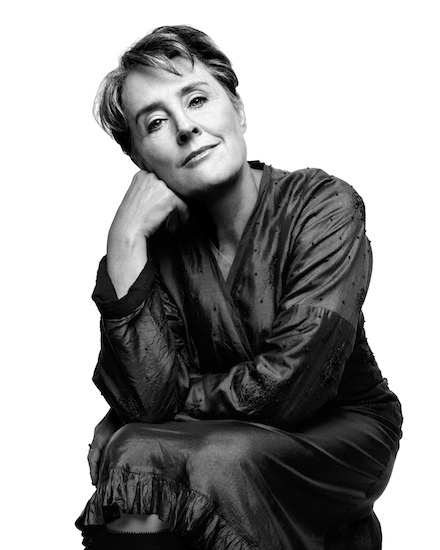Tanya Steel, Epicurious
Alice Waters has shaped our food culture, our restaurants, our home kitchens, and even our gardens for more than four decades. When she opened Chez Panisse in 1971 with a few friends in an out-of-the-way spot outside San Francisco, Waters gave rise to a food movement that was forward thinking in its backward glance: Eating as seasonally and sustainably as possible, just as Americans did before the rise of modern food production in the 1930s and 1940s.
More than 40 years later (not to mention 13 books, 2 foundations, and more awards and honors than probably any other American food personality), Waters continues to influence what we cook and eat, and how we garden. In an interview with Epicurious, the Chez Panisse chef and true earth mother expanded on the "vital link between taste, cooking, and gardening," what prompted her to start the Edible Schoolyard, and who, besides a certain hip hop mogul, would be her fantasy dinner guest.
Epicurious: The first edition of The Art of Simple Food came out in 2007. Since that time, the notion of eating farm to table, a message you've espoused for decades, has become the norm, at least in America's restaurant world. Do you see this always being the prime philosophy of chefs, or do you wonder or fear that this will end up being more of a trend than cultural movement in the future?
Alice Waters: This is not a trend. This is us coming back to our senses.
EPI: Your newest book has the encyclopedic information of the Farmer's Almanac, the recipe editing style of Joy of Cooking, and food that is sophisticated, seasonal, and relatively simple, like your first The Art of Simple Food. Was that your intention and how many years did you work on this book?
AW: I feel like I have been working on these books my entire life, or at least as long as I have been cooking. These books are a collection of not only the things I have learned but also the collective wisdom of the family of Chez Panisse.
The first book really spoke to the beginning cooks and so we drew on all the things that we have developed over time at Chez Panisse's kitchen and my own at home. The second volume we went out into the kitchen garden and out to the farms to really collect the wisdom of the land. It celebrates all the different types of fruits and vegetables, which are the basis of really delicious cooking.
SEE MORE: Foods That Are Keeping You Up at Night
EPI: You've been called the mother of modern American cooking. How would you define what that means -- and what that means to you?
EPI: I've never thought of myself that way but if it means that my children are cooking real food with real ingredients then like any mother, I'm extremely proud.
EPI: In 1996 you founded the Chez Panisse Foundation to use food to help empower and inspire kids, and out of that grew (pardon the pun) the Edible Schoolyard project. What gave you the idea initially?
EPI: After being open for decades I realized that Chez Panisse couldn't be an island unto itself and that we needed to become involved in a wider way. I made a comment in the local press about the state of our local middle school's grounds.
The principal called me up to his office and asked me to be involved in some way in beautifying the campus but once I saw the empty lot I immediately had the idea that it could grow food and the kids could be involved. From there grew the idea of the Edible Schoolyard. I wanted a garden and kitchen that could enrich the lives of the student and the school. Something that would be integrated into curriculum.
EPI: What do you see its core mission as these days?
EPI: I think we have to transform school lunch in this country. I want every child in America to eat a nutritious, delicious, sustainably sourced school lunch for free. I think that is the way to transform both education and agriculture in this country overnight.
EPI: For years you've advocated for the White House to have its own Victory Garden, as it were. Have you had a chance to sample any of the produce that Mrs. Obama now grows there and how excited are you to see your dream come to fruition at America's home?
SEE MORE: 5 Foods That WON'T KIll You
EPI: Yes I have and yes I was very excited to see Mrs. Obama in that garden with children talking the good talk. It was an image that was beamed all around the world and I think it is impossible to understate the influence of her positive example.
EPI: Who inspired and inspires you?
EPI: English food writer Elizabeth David, cook and author Richard Olney and the owner of Domaine Tempier Lulu Peyraud have all really inspired the way I think about food. I continue to be inspired by Slow Food founder Carlo Petrini. And in general I am inspired by all the young cooks, farmers and activists that are so dedicated to changing the world through food.
EPI: Could you ever imagine retiring from Chez Panisse? What do you want its future to be?
EPI: No. We will continue to evolve as we always have. I might be officially the owner but I feel like I share it with the now hundreds of people who have worked there and have each made a special contribution.
EPI: If you could have anyone for dinner at a beautiful table in a flourishing garden, besides your family, who would you like to break brioche with?
EPI: Ai Wei Wei, the new Pope, Youssou N'dour, Meryl Streep, and Jay-Z.
